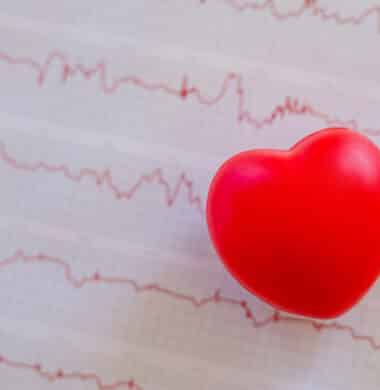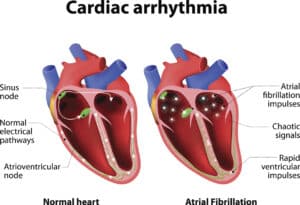Conditions We Treat at Our Arrhythmia Clinic

An irregular heartbeat, often referred to as an arrhythmia, is a condition that occurs when the electrical impulses in your heart don’t work properly, causing a problem with the rhythm or rate of your heartbeat. This may result in your heart beating:
- Too quickly
- Too slowly
- With an irregular rhythm
While many arrhythmias aren’t serious, there are situations when this condition can be very dangerous and even life threatening. When you have an arrhythmia, your heart may struggle to pump enough blood to the rest of your body, which can potentially result in issues that can impact your ability to function.
Receive Treatment at South Denver Cardiology’s Arrhythmia Clinic
At South Denver Cardiology, we have a world-class Arrhythmia Clinic to help patients manage this potentially dangerous condition. Our cardiologist-supervised, nurse practitioner-led clinic was modeled after similar facilities around the world which have demonstrated superior outcomes treating arrhythmias. Many of these clinics have proven highly effective at:
- Controlling arrhythmias and their symptoms
- Preventing hospitalization
- Preventing stroke
- Reducing healthcare costs
- Treating contributing health issues
Our Arrhythmia Clinic gives individuals in the Denver area access to the best treatment options to control your heart rhythm and optimize your heart health. All our treatments are based on the latest research, ensuring you receive the most advanced solutions available.
Types of Arrhythmias We Treat

- Atrial fibrillation – An unorganized, chaotic heart rhythm that originates from the upper left chamber of the heart. Individuals with atrial fibrillation experience electrical activity in their pulmonary veins, causing the heart to fire in a rapid, irregular pattern.
- Typical atrial flutter – A type of abnormal heart rhythm that develops when your heart’s upper chambers beat too fast, causing the heart to pump in a fast, inefficient manner. Unlike atrial fibrillation, which is associated with an irregular pattern, patients with typical atrial flutter experience a coordinated pattern to their rapid heartbeat.
- Supraventricular tachycardia (SVT) – A rapid heart rhythm that initiates in the upper heart chambers and travels down to the lower chambers via extra connections in your heart’s circuitry.
- Premature ventricular contractions (PVCs) and nonsustained ventricular tachycardia (NSVT) – Extra heartbeats coming from the lower chambers of the heart. When these extra heartbeats (PVCs) occur three or more times within 30 seconds, the condition is referred to as NSVT.
- Sustained ventricular tachycardia (VT) – A fast and chaotic heart rhythm coming from the lower chambers of the heart which lasts more than 30 seconds. Unlike NSVT, sustained VT is considered life threatening and can potentially lead to cardiac arrest.
- Atrioventricular nodal reentry tachycardia (AVNRT) – The most common type of SVT, resulting from the formation of an extra pathway in the atrioventricular node. The condition causes an irregularly fast heartbeat that typically starts and ends suddenly.
- Atrioventricular reentry tachycardia (AVRT) – A type of SVT that causes your heart to beat too fast. It is caused by an extra pathway between your upper and lower heart chambers.
- Atrial tachycardia – An abnormally rapid heart rhythm occurring when the electrical signal controlling your heartbeat originates from an unusual location in the upper heart chambers.
- Premature atrial contractions – Extra heartbeats originating from the upper chambers of your heart.
- Bradycardia – A slow heart rate of less than 60 beats per minute. This condition is caused by slowed electrical conduction through the heart.
Treatments Offered at Our Arrhythmia Clinic
Our Arrhythmia Clinic offers a wide range of treatments to address just about any irregular heartbeat condition you may have. Our team will perform comprehensive diagnostic testing to determine the cause of your heart rhythm problems. This testing may include:
Once the specific cause of your arrhythmia has been identified, our cardiologists will recommend the right electrophysiology procedure to address the condition. We perform the following electrophysiology procedures as part of our arrhythmia treatment:
- Cardioversion
- Atrioventricular node ablation
- Atrial fibrillation ablation
- Pacemaker implant
- Cardioneural ablation
- SVT ablation
- Typical atrial flutter ablation
- PVC and VT ablation
- Defibrillator implant
Contact us today to schedule an appointment at our Arrhythmia Clinic. South Denver Cardiology Associates serves patients in Denver, Littleton and the surrounding areas of Colorado.
- 9 Tips to Reduce Holiday Stress - December 11, 2025
- 6 Tips for Exercising Outdoors with a Heart Condition - May 19, 2025
- Lifestyle Changes That Can Help Manage Arrhythmia - April 30, 2025
Sign Up
As with any health concerns, your specific treatment program should be discussed thoroughly with your primary care physician as well as any specialists who may need to be consulted – like a cardiologist.
Sign Up
